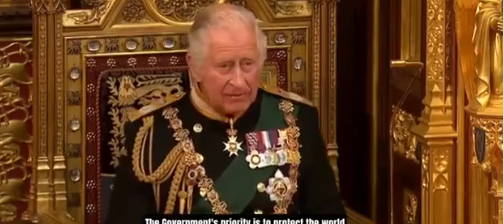Our cousins on the other side of the Atlantic are still unsettled politically.
Keir Starmer, the newly elected Prime Minister of the UK, presented an ambitious agenda in his first ceremonial King’s Speech, portraying himself as the antidote to the “snake oil charm of populism.” His plans, announced on Wednesday, targeted housing, crime, illegal migration, and the public’s eroding trust in government.
In a grand ceremony that merged royal pageantry with political gravity, King Charles III opened the new parliamentary session by reading Starmer’s sweeping agenda, just two weeks after Starmer’s landslide victory ended 14 years of Conservative rule.
The work of change continues with the first King’s Speech of the new Labour government.
A packed programme reflecting @Keir_Starmer’s ambition for a decade of national renewal.
We’ll create the first smoke-free generation and reform the Mental Health Act (that’s as old as me!). pic.twitter.com/Rr3wLhOWP0
— Wes Streeting MP (@wesstreeting) July 17, 2024
Starmer’s speech, centered around the theme of “national renewal,” included promises to nationalize Britain’s railways, reform planning laws to build more affordable homes, and ramp up efforts to curb illegal migration. He also took aim at the Conservative governments that had been in power since 2010 and criticized the populist movements that have gained traction across the UK and Europe, advocating instead for pragmatic solutions.
“No more wedge issues. No more gimmicks,” Starmer told lawmakers in the House of Commons, emphasizing his government’s intent to solve problems rather than exploit them. “The fight for trust is the battle that defines our political era,” he asserted.
Starmer’s 40-bill agenda aims to appeal to a wide range of voters, from older generations to the youth. However, the speech was light on details in some areas, such as specific measures to bolster border security, despite public concern over small boat crossings.
“…but first, here’s why a King’s Speech with the most new bills since 2005 is almost certainly bad news for Keir Starmer.”#BBCLauraK pic.twitter.com/ItTM42sM5G
— Alexander Richards (@AlxdrRchrds) July 17, 2024
Notably, Starmer steered clear of contentious constitutional and voting reforms, such as imposing an upper age limit for peers in the House of Lords and lowering the voting age to 16. The state opening of parliament, marked by centuries-old traditions, saw King Charles and Queen Camilla travel from Buckingham Palace to Parliament, where MPs were summoned by Black Rod.
In a dramatic role reversal following Labour’s landslide election win on July 4, Starmer and his defeated rival, Conservative leader Rishi Sunak, shared warm exchanges before and after the speech.
Attention then shifted to Labour’s first legislative plan in over a decade. Starmer reiterated his commitment to nationalize the rail network and establish a publicly-owned renewable energy company, aiming to rejuvenate Britain’s stalled infrastructure projects.
Starmer also vowed to tackle illegal migration and small boat crossings, issues that plagued previous Conservative governments and boosted support for the anti-migrant party Reform UK. His plans include empowering law enforcement to combat people smuggling and addressing the massive asylum backlog, which has grown to nearly 100,000, forcing asylum seekers into temporary accommodations for extended periods.
🔴🔵 Prime Minister of the United Kingdom Sir Keir Starmer’s first King’s Speech as Prime Minister took place today, where UK’s King, Charles outlined some of the plans of the Labour government.#primeminister #keirstamer #britain #ln24intl #ln24intlnews pic.twitter.com/CXqU0n4S1S
— LN24 International (@ln24_intl) July 17, 2024
Domestically, Starmer aims to modernize several institutions, including the House of Lords, by ending hereditary peers’ voting rights as part of a broader reform. He also announced a new Race Equality Bill requiring large employers to report ethnicity and disability pay gaps, following the model for gender pay reporting.
Additionally, Starmer committed to banning gay and transgender conversion therapy, a promise first made by Theresa May in 2018 but never fulfilled. He acknowledged the public’s growing distrust in politics, exacerbated by recent scandals, and stressed the need for significant reforms.
Despite his ambitious plans, there is skepticism about whether Britain’s public services can be revitalized without substantial funding increases. The speech offered little on the NHS or social care, focusing instead on management improvements.
After the King’s speech, MPs gathered to debate Labour’s agenda. Sunak promised a constructive opposition while the Conservatives undergo a leadership contest. “The party opposite has successfully tapped into the public’s desire for change, but they must now deliver change,” Sunak said, urging Starmer to maintain increased defense spending to assure NATO allies.
Major points
- Keir Starmer presents an ambitious agenda in the first King’s Speech, emphasizing “national renewal.”
- Plans include nationalizing railways, addressing the housing crisis, and cracking down on illegal migration.
- Speech avoids divisive constitutional issues, focusing instead on pragmatic solutions and rebuilding public trust.
- Starmer commits to banning conversion therapy and reforming the House of Lords.
- Former PM Rishi Sunak promises constructive opposition, emphasizing economic growth and defense spending.
Conner T – Reprinted with permission of Whatfinger News



